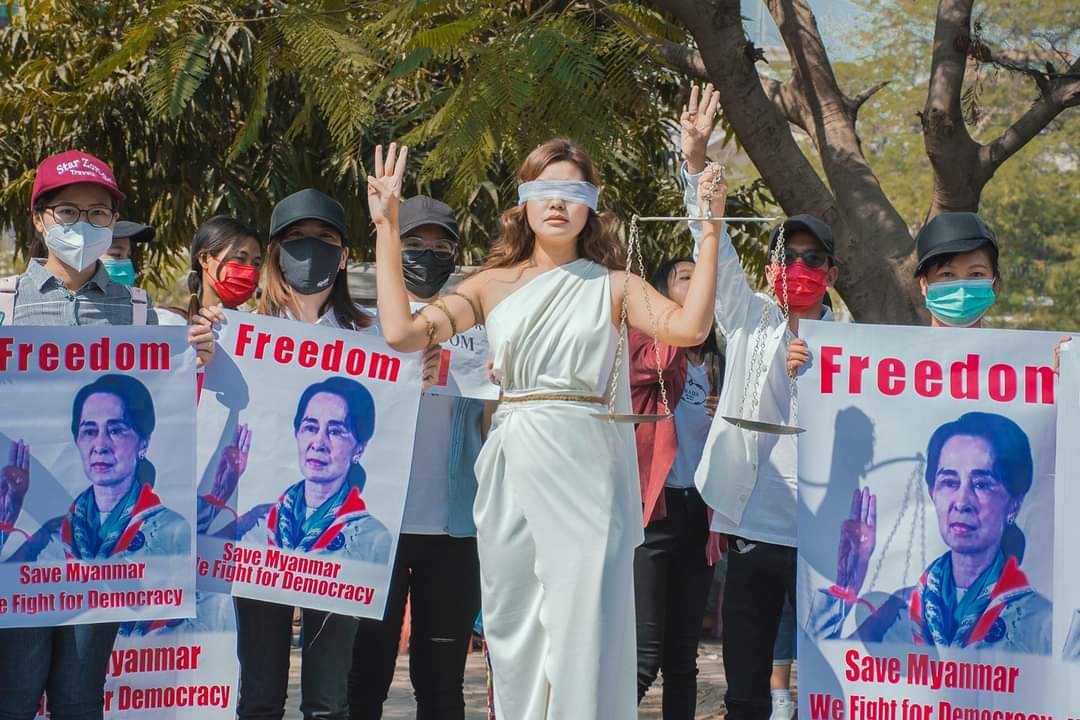On February 1, State Counsellor Aung Sun Suu Kyi, President Win Mying, exponents of the National League for Democracy (NLD), activists, and journalists were arrested in a military coup that is seriously endangering Myanmar’s fragile democratic apparatus. Recent weeks have seen an expanding spiral of violence and an intensification of clashes between armed ethnic groups and the military. This risks descending the country on the brink of a civil war, that would have severe repercussions for decades to come.
Since the military coup, the Association for Political Prisoners reported 729 civilian deaths; 3.800 people are currently detained, 23 of which have been sentenced to death following secret trials. Reports indicate that the Tatmadaw intentionally opened fire in the south of the country and that security forces prevented medical personnel from helping the wounded as well as charging a fine of USD 90 to claim the bodies of those who were killed. In April, 180,000 pieces of evidence have been deposited to the UN investigators, showing human rights abuses by the military. This is the result of only two months of mass protests against the military coup that called off the electoral results. Only a few months earlier, in December 2020, the NLD and its leader Aung Sun Suu Kyi had won a landslide victory.
The reasons that brought the military to seize power are still questionable, and equally questionable are Myanmar’s coming times. Despite internet blackouts, full-day curfews and violent repression, mass protests led by the Civil Disobedience Movement (CDM) are growing in intensity. Not only the military does not seem willing to step back but it is also adopting several repressive techniques against protesters. It is just of a few days ago, the bombing by the military aircraft on some villages in the Karen State, which claimed eight lives and displaced 3000 over the border with Thailand.
Woefully, this is not an unprecedented situation in the history of the country. Already in 1988, the so-called “8888 uprisings” saw thousands of students, civil society exponents, Muslims, and workers protesting against the military regime. It ended after six months, leaving 3000 to 10000 dead. Myanmar cannot afford to recede to an authoritarian regime. It would be detrimental to the development of the country, and is likely to produce a failed state.
The Bamar majority and ethnic groups seem to have created a common front against the military regime. This would be unprecedented in the history of the country. There are 135 ethnic groups in Myanmar and ethnicity has always been considered a divisive element. Ethnic groups have often been antagonized, notably by the NLD government which has often been accused of instituting a “Burmanization” policy to suppress non-Bamar religions. This new sense of solidarity, however, plays on a very fragile balance. It might turn the tables, but it could also bring Myanmar to the brink of a civil war.
In recent weeks an increasing number of young people have enlisted in the Kachin Independence Army (KIA), one of the most violent non-state groups in the country. Worryingly, other armed groups have started recruitments as well. Some young recruits revealed to Frontier Myanmar, an independent online news source, that this is the best chance to start an armed revolution. They declared that, while in the past only non-Bamar ethnic people fought against the military; now, people in urban areas have faced many brutal attacks, and “that’s why it’s time to fight together”.
The confrontation between the military and armed groups is indeed flaring anew. Armed groups have released statements declaring their right to defend their territories and civilians from military attacks. Several rebel armies have declared their intention to join hands if the military attacks do not stop and some ethnic groups such as the Karen National Union have called for a federal army bringing together armed ethnic groups from across the country under one umbrella. This new sense of solidarity between the Bamar majority and ethnic groups seems to have spread the feeling that an armed revolution is the only way forward.
The UN High Commissioner for Human Rights Michelle Bachelet warned about the risks of such a full-blown conflict. Alarmingly, she recalled Syria of 2011. At that time, disproportionate force against peaceful protestors, the rapid escalation of violence across the country and the failure to intervene by the international community proved disastrous for Syria and provoked horrific consequences on millions of civilians for the coming years. Already in the last months, Myanmar’s economy and health infrastructure have been brought to the brink of collapse, with millions of people without humanitarian assistance and basic services. Immediate and decisive actions are needed, especially from the international community. According to Dr. Sasa, the political representative of the National Unity Government, the recently established shadow government, a “call from Moscow or Beijing would suffice to stop the violence”. Undoubtedly, the interests at stake in Myanmar are much more complex. However, hat without urgent action from the international community, Myanmar would dangerously be heading toward a disastrous civil war.

